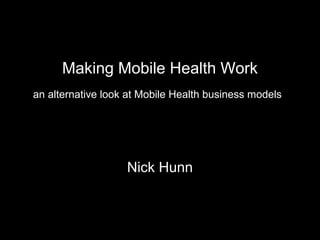Disruptive mobile health business models
- 1. Making Mobile Health Work Nick Hunn an alternative look at Mobile Health business models
- 2. mHealth isnŌĆÖt about curing disease thatŌĆÖs too hard. itŌĆÖs not a business model. leave that to the health servicesŌĆ”
- 3. itŌĆÖs about what people will pay for. maintaining quality of life, enhancing self image, assuaging guilt, convenience.
- 4. itŌĆÖs all about compelling services. and if you want to make money,
- 5. so donŌĆÖt bother about: 1. doctors 2. insurers 3. hospitals theyŌĆÖre just barriers.
- 6. letŌĆÖs look at some real business models that might make Mobile Health happenŌĆ”
- 7. The Guilty Look at current models that work (Weightwatchers, etc.). Target the worried well. Work out how to use loyalty for ongoing service revenue. Remove the guilt from not having to have your parents live with you (a.k.a. Assisted Living).
- 8. The Gullible Alternative healthcare has less regulation. It has fast development and deployment cycles. Look on it as the pornography of health (and remember that porn was responsible for most web developments).
- 9. The Drug Dealers Our average lifetime pill consumption is 54,000 pills. Kick the doctors out of the loop. Monitor and dispense generics directly to the patient. Think about the opportunities in medication compliance for vitamin pills (and encourage overdoses).
- 10. The Supermarket They know what you buy, They know how to mine data, ItŌĆÖs easy to add sensors to a shopping cart handle, Diagnose customers as they shop and sell them healthcare as part of your loyalty scheme.
- 11. The Workforce Make your workforce fitter. Sell a Faustian pact of compliance versus healthcare. Increase presenteeism, reduce absenteeism. Tell your shareholders that you care for your employees. (Even if you really only care about your bottom line.)
- 12. The Wisdom of (sick) Crowds Engage with those patients that DO care, Use their experience to build compelling feedback, Consider how to make it Open Source. Charge a monthly subscription for using their data (and selling it to someone else).
- 13. Be aware of the Barriers 1. the medical profession 2. regulation and rememberŌĆ” the biggest barrier is probably your imagination and avoid them.
- 14. if mHealth is going to workŌĆ” we need to stop thinking like doctors, and start thinking like patients consumers.consumers..
- 15. If all else failsŌĆ” ŌĆ”thereŌĆÖs still pets and kids.
- 16. Unless youŌĆÖre in the U.S. as FDA regulations extend to pets and cosmetics.
- 17. thereŌĆÖs a business model somewhereŌĆ” you just need to look hard enough.
- 18. nick@wifore.com +44 7768 890 148 Thanks Read more on the blog: www.nickhunn.com


















